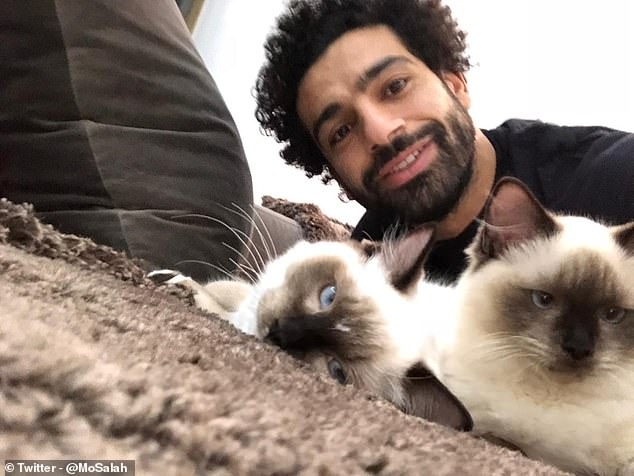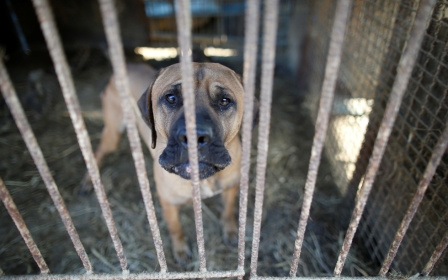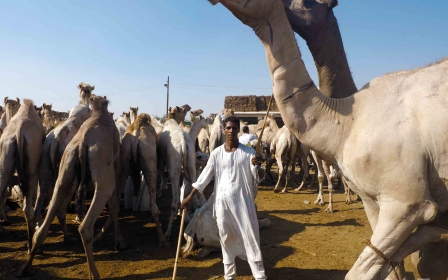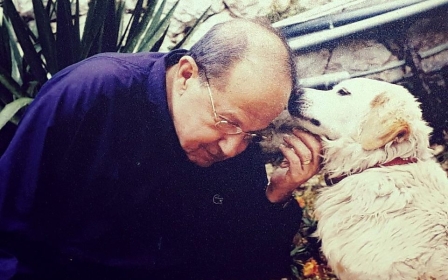'This will not happen': Mo Salah decries Egyptian plan to export cats and dogs

Posing for a selfie by two Siamese cats, Egyptian football star Mohamed Salah has joined scores of activists, celebrities and animal rights advocates to denounce a purported plan by Egypt to export cats and dogs to countries that eat them.
“Cats and dogs will not be exported anywhere. This will not happen and cannot happen,” the Liverpool winger wrote in Arabic on Twitter, with the hashtag #NoToViolatingAnimalRights.
Egyptian animal rights advocates have launched an online campaign over reports that Egypt would allow the exportation of stray cats and dogs to countries that consume them as food, including South Korea.
Using the hashtag “No to violating animal rights” and “Against exporting dogs”, Egyptian activists and public figures called on the government to abandon a plan to export stray cats and dogs proposed by a member of parliament last month.
A backlash from animal rights activists prompted an Egyptian government official to reverse earlier statements that his ministry had recently licensed the export of 4,100 cats and dogs to a number of countries. On Sunday, Hamed Abdeldayem, the spokesperson of the Egyptian Ministry of Agriculture, dismissed the reports that quoted his TV interview as “rumours”.
Translation: “I thought that the news about exporting cats and dogs to countries that eat them was nothing more than a surreal, absurd, disgusting proposal that no one would pay attention to. Egypt is impressive. It surprises us beyond imagination.”
Pro-government talk show host Amr Adeeb also condemned the reported exportation, and called on the government to stop the exports “out of mercy” for animals.
“I would just like to ask an economic question: How much revenue would these dogs and cats exported to Asian countries bring to Egypt? Egypt is a merciful country, a religious country. We don’t need this,” Adeeb said.
In September and October, licenses to export 2,400 cats and 1,700 dogs from different breeds were granted, according to the General Authority for Veterinary Services (GAVS).
The GAVS said the process was done in accordance with international regulations governing the exporting of animals, including making sure they are free from disease.
This was the first time Egypt has exported dogs and cats, according to Abdeldayem.
The dogs and cats were mainly “taken from the streets” but have been vaccinated and given a medical certificate from the Animal Health Institute saying they are disease-free, before being exported, Abdeldayem said in an interview with TEN TV last Wednesday.
He did not reveal the countries that the animals were going to be exported to but he said there were no particular conditions in place to decide their destination.
Officials have not given specific reasons as to why the animals were now being exported. Egypt has long complained of the number of stray dogs and cats in the country. Last month, a study reported that as many as 22 million stray dogs were on the loose in Egypt.
Although authorities have not disclosed the cats and dogs' destinations, many Egyptians have assumed they would be sent to countries with poor animal rights records.
The proposal
The export licenses come a month after the deputy chairperson of the parliamentary human rights committee, MP Margaret Azer, called for stray dogs to be sent to countries where people are known to eat them, like South Korea.
On 9 October, Azer proposed solving the strays problem by “gathering them in one place in the desert, providing them with a healthy diet for one week, and then exporting them”.
Azer claimed that “a number of South Koreans have criticised Egypt for failing to export its stray dogs, instead letting them harm [people] in the streets".
The MP said she believed the exports could boost the Egyptian economy and eradicate disease-ridden animals from streets, which she said have become “a burden on the Egyptian citizen”.
Around one million dogs are consumed in South Korea annually. Although their meat is considered a delicacy, attitudes towards eating dogs are changing rapidly, especially among young people there.
Still, according to the Humane Society International, "South Korea is the only country in Asia where dogs are routinely and intensively farmed for human consumption."
Last Thursday, South Korea's largest dog slaughterhouse began to be dismantled and will be turned into a public park.
Middle East Eye propose une couverture et une analyse indépendantes et incomparables du Moyen-Orient, de l’Afrique du Nord et d’autres régions du monde. Pour en savoir plus sur la reprise de ce contenu et les frais qui s’appliquent, veuillez remplir ce formulaire [en anglais]. Pour en savoir plus sur MEE, cliquez ici [en anglais].




